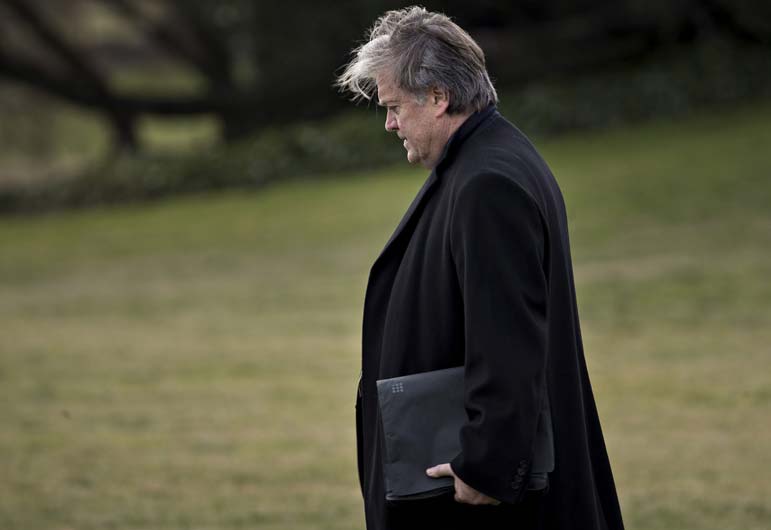 Andrew Harrer for Bloomberg.
Andrew Harrer for Bloomberg.
Specifically, if the book ends Stephen Bannon's rise in the Republican Party, then there is a better chance of a Republican coalition developing that will be stronger in the 2018 midterm elections. And that would be very good for the president.
So far, Trump has never really governed with a coalition. There has never been a melding together of Trump rally attendees and rabid supporters with shellshocked Republican regulars and elected officials who have to build campaigns and win elections. And with Bannon on the warpath, it was impossible for the Trump wing of the GOP and the congressional wing of the party to truly come together.
Bear with me, but with Bannon gone, perhaps today there is a Trump coalition in the making. There is something of an alliance between traditional Republicans who want to see the Republican majority make good policy and Trump faithfuls who traditionally vote Republican but have been dissatisfied with the results of Republican rule in the House and Senate. Traditional Republicans rightfully see Trump as the necessary tool to allow good policy to become law. There is another side of the Trump coalition that wants to destroy the current political order but doesn't really have a governing plan. True Trump loyalists trust that the president won't become bogged down in the swamp and won't become trapped into just doing more of the same.
So, as long as traditionalists are getting their bills signed and judges confirmed, and the Trumpites are assured their man hasn't forgotten them, the coalition can exist. Bannon's desire to destroy Senate Majority Leader Mitch McConnell, R-Ky., and defeat other functioning Republicans made a Trump coalition impossible.
Just as there is no place for Bannon in a governing coalition, there is similarly not much use for someone like Sen. Jeff Flake, R-Ariz. Flake revels in the attention he gets from the mainstream media for being anti-Trump, personally belittling the president and highlighting Trump's character flaws. Trump offers plenty to criticize, but for a party leader to make Trump-bashing his principal purpose does not help the party meet the responsibilities that voters have given it.
In their own ways, Bannon and Flake have become obstructionist showmen who merely distract, rather than contribute to the coalition's governing or electoral prospects. Sen. Lindsey Graham, R-S.C., seems to have come around somewhat on Trump. Others should take notice.
We have already seen how a Trump coalition can work. Trump voters trust the president to not be seduced by the establishment and the status quo, and establishment Republicans have found Trump to be more conservative in his personnel decisions and policy positions than they ever dreamed possible. The problem that establishment Republicans have with Trump is his personal behavior, his inattention to the role a president plays in maintaining world order, his gaps in knowledge and his indifference to our traditional alliances. His immaturity alarms and disenfranchises a lot of voters who would otherwise think his policy victories, particularly on the economic front, are something they would vote for. These are the voters who are glad to see Bannon gone.
Anyway, Trump is here to stay. Despite what the Democrats and their allies in the media are hoping for, he's not going to be removed from office. And while his behavior can't be excused, it shouldn't destroy the coalition that is forming around his presidency.
Bannon wasn't the cause of Trump's bad behavior, and there is no reason to think that his departure will make Trump more poised, mature or thoughtful. So, the question becomes not only whether the coalition will produce results that make voters overlook the president's flaws, but also whether the Democrats have candidates capable of diminishing the president's power and somehow checking his damaging behavior.
Regular GOP voters know that the turmoil produced by Bannon only served the Democrats and the mainstream media, who want to resist Trump's policies and obsess over his personal inadequacies. But despite the president's shortcomings as well as Bannon's poisonous presence and that of quitters like Flake, the Trump presidency is a net plus for both sides of the emerging coalition.
That could change at any moment - particularly if there is a blunder overseas or a miscalculation that leads to war. But if there is no disaster, who knows, maybe there could be something of a Trump renaissance. With the conventional wisdom, the predictable media and others heavily invested in promoting the idea that Trump is a disaster, well, what if there is no disaster? What if the economy really ignites, and there isn't a foreign calamity, a Mueller showstopper or a terrorist attack? It would be a disaster for the Democrats and their allies in the media.
So, for now, the GOP coalition needs its leaders to focus on getting actual tangible results - results that voters will notice and therefore be less inclined to think a change is in order in the 2018 midterms and that the Democrats could do better.
Ed Rogers is a a political consultant and a veteran of the White House and several national campaigns. He is the chairman of the lobbying and communications firm BGR Group, which he founded with former Mississippi Gov. Haley Barbour in 1991."


 Contact The Editor
Contact The Editor
 Articles By This Author
Articles By This Author